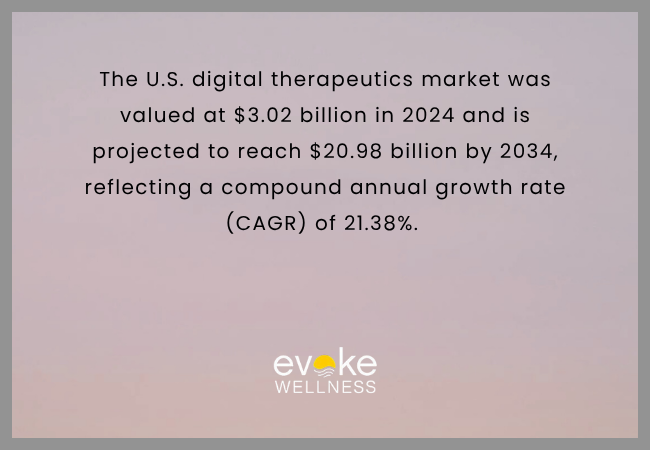The evolution of technology is transforming every aspect of modern life—including how we understand, treat, and manage behavioral health. In recent years, digital therapeutics have emerged as a critical tool in behavioral health treatment, revolutionizing accessibility, engagement, and long-term recovery outcomes. These tools include everything from AI-powered chatbots and mobile therapy apps to remote monitoring systems that support clients long after they’ve left the physical walls of a treatment center.
This shift is especially impactful for those navigating addiction, co-occurring mental health disorders, and other behavioral health challenges. As the demand for innovative, patient-centered care grows, understanding the role of digital therapeutics in comprehensive treatment programs becomes vital.
Understanding Digital Therapeutics in Behavioral Health
Digital therapeutics refers to evidence-based, software-driven interventions designed to prevent, manage, or treat physical or behavioral health conditions. Unlike general wellness apps, digital therapeutics are often clinically validated, sometimes FDA-approved, and integrated into a broader clinical care plan.
In behavioral health, this could include cognitive-behavioral therapy (CBT) modules delivered through an app, real-time mood tracking tools, AI-driven mental health assessments, or gamified tools that encourage healthy behavior changes. These technologies empower individuals to take an active role in their recovery while offering providers powerful insights into their progress.
Why Digital Tools Are Gaining Ground in Behavioral Health
Several challenges within the traditional behavioral health system have driven the rise of digital therapeutics. Among them:
-
Accessibility: Not all individuals can attend in-person therapy regularly due to geographic, financial, or scheduling barriers.
-
Continuity of care: After discharge, patients often experience a lack of structured support, which increases the risk of relapse.
-
Data-driven care: Clinicians are seeking tools that offer real-time data to personalize and adapt treatment.
Digital therapeutics address these pain points by keeping individuals connected, engaged, and accountable, regardless of location. For instance, a person enrolled in an Intensive Inpatient Treatment Program in Miramar, Florida may transition home with a digital care plan that includes daily check-ins through an app, guided meditation exercises, and secure messaging with their therapist.
AI-Powered Support and Predictive Analytics
Artificial intelligence (AI) has been particularly transformative. Today’s platforms are capable of analyzing speech and typing patterns to detect signs of depression, anxiety, or relapse risk. Machine learning models can identify behavioral trends and recommend intervention strategies before a crisis occurs.
Chatbots powered by AI are increasingly common in apps that provide 24/7 support. While not a replacement for human connection, these tools offer immediate, judgment-free interaction and guidance during moments of stress.
These capabilities are not limited to outpatient care. They are also being integrated within more structured environments such as a Partial Hospitalization Program in Miramar, Florida, where AI tools support providers in tracking patient engagement and emotional regulation patterns between sessions.
Mobile Therapy Apps: Bridging Gaps and Reducing Stigma
Apps like Talkspace, BetterHelp, and Woebot have normalized digital access to therapy and mental health education. These platforms allow users to communicate with licensed therapists via text or video calls, often at a lower cost than traditional therapy.
For those uncomfortable with in-person care, particularly due to stigma or social anxiety, these apps offer a stepping stone. By enabling confidential, at-home support, they can serve as a crucial entry point into deeper therapeutic engagement or even serve as adjuncts to existing care in a Residential Mental Health Treatment in Miramar, Florida setting.
Remote Monitoring and Wearable Integration
Modern behavioral health care increasingly includes wearable devices that monitor sleep, heart rate variability, and physical activity—metrics that correlate strongly with mental health states. When integrated into a treatment program, this data provides clinicians with objective insights into patient well-being.
For instance, a sudden decrease in sleep duration or an increase in resting heart rate might prompt a follow-up with the client to assess for symptoms of anxiety or relapse triggers. This real-time monitoring, paired with digital communication tools, allows providers to intervene early and adapt treatment plans quickly.
Facilities like a Behavioral Health Treatment Center Miramar, Florida can integrate these insights with patient care dashboards, ensuring that both patients and providers are aligned in goals and progress.
Enhancing Therapeutic Engagement Through Gamification
Engagement is one of the biggest hurdles in behavioral health care. To combat this, many digital platforms are using gamification—applying game elements such as points, badges, or progress maps to therapy tasks.
This approach taps into reward systems in the brain, encouraging users to complete therapeutic exercises, log daily journals, or maintain sober streaks. In doing so, gamification not only increases user retention but also provides measurable data to therapists and care teams.
In structured settings, gamified tools complement traditional therapy, reinforcing daily goals and routines that support recovery.
Personalization and Scalability of Care
Digital therapeutics offer unparalleled scalability. A single platform can serve thousands of users, delivering customized experiences based on individual needs. Personalized therapy modules, AI-curated recommendations, and user-specific notifications ensure that treatment remains relevant and responsive.
Moreover, these platforms often include community features like peer forums and support groups, which reduce isolation and build connection—core components of sustainable recovery.
When integrated into larger programs like inpatient or outpatient services, digital therapeutics provide a flexible framework for patients to engage with their care at their own pace, while maintaining connection with their clinical team.
Why Choose Evoke Wellness?
At Evoke Wellness, we’re committed to blending cutting-edge innovation with compassionate, evidence-based care. Our multidisciplinary team recognizes the immense value that digital tools bring to modern treatment models. We don’t believe in one-size-fits-all care—instead, we develop individualized plans that can include technology-assisted therapies for a seamless and holistic experience.
Whether you’re participating in a Behavioral Health Treatment Center Miramar, Florida or transitioning back to daily life, we ensure that you have the right tools—digital and personal—to stay connected, informed, and supported every step of the way. Our approach combines professional expertise with emerging technology to create the strongest foundation for lasting healing.
Conclusion
As the behavioral health landscape continues to evolve, digital therapeutics will play an increasingly vital role in supporting recovery, promoting engagement, and improving access. While these tools will never replace human empathy or therapeutic relationships, they serve as powerful extensions of care—enhancing support during and after treatment.
For individuals struggling with mental health or addiction, the integration of digital solutions offers a more accessible, consistent, and empowering path toward healing. At Evoke Wellness, we believe in the future of behavioral health—and we’re building that future today. To learn more about our programs or begin your journey, call us at 866.429.2960.
Frequently Asked Questions (FAQs)
What are digital therapeutics in behavioral health?
Digital therapeutics are software-based tools, such as apps or online platforms, that provide evidence-based treatment and support for mental health and addiction.
How do digital tools support inpatient or outpatient treatment?
These tools can complement in-person care by offering daily check-ins, therapy modules, and remote monitoring, increasing engagement and continuity of care.
Are AI chatbots a replacement for real therapists?
No. AI chatbots are designed to offer immediate support or coping strategies but should be used alongside licensed professionals in a structured treatment plan.
Can wearable technology help monitor mental health?
Yes. Wearables can track physiological indicators like heart rate and sleep, which help providers detect stress patterns or potential relapse triggers early.
How do I know if digital therapeutics are right for me?
If you’re in a treatment program or transitioning back to daily life, digital tools may provide added structure and support. Consult with a provider at Evoke Wellness to find out if it suits your recovery plan.



